人教版七年级英语下册第二单元知识点汇总
人教版七年级下册英语第二单元知识点

人教版七年级下册英语第二单元知识点(经典版)编制人:__________________审核人:__________________审批人:__________________编制单位:__________________编制时间:____年____月____日序言下载提示:该文档是本店铺精心编制而成的,希望大家下载后,能够帮助大家解决实际问题。
文档下载后可定制修改,请根据实际需要进行调整和使用,谢谢!并且,本店铺为大家提供各种类型的经典资料,如办公资料、职场资料、生活资料、学习资料、课堂资料、阅读资料、知识资料、党建资料、教育资料、其他资料等等,想了解不同资料格式和写法,敬请关注!Download tips: This document is carefully compiled by this editor. I hope that after you download it, it can help you solve practical problems. The document can be customized and modified after downloading, please adjust and use it according to actual needs, thank you!And, this store provides various types of classic materials for everyone, such as office materials, workplace materials, lifestyle materials, learning materials, classroom materials, reading materials, knowledge materials, party building materials, educational materials, other materials, etc. If you want to learn about different data formats and writing methods, please pay attention!人教版七年级下册英语第二单元知识点人教版七年级下册英语第二单元知识点总结知识点的归纳,会方便我们记忆初一下册英语课本上的内容。
人教版七年级英语下册Unit 2知识点汇总
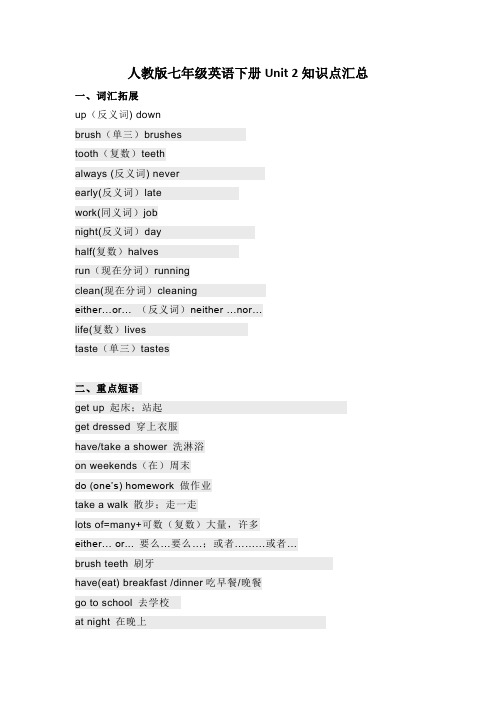
人教版七年级英语下册Unit 2知识点汇总一、词汇拓展up(反义词) downbrush(单三)brushestooth(复数)teethalways (反义词) neverearly(反义词)latework(同义词)jobnight(反义词)dayhalf(复数)halvesrun(现在分词)runningclean(现在分词)cleaningeither…or… (反义词)neither …nor…life(复数)livestaste(单三)tastes二、重点短语get up 起床;站起get dressed 穿上衣服have/take a shower 洗淋浴on weekends(在)周末do (one’s) homework 做作业take a walk 散步;走一走lots of=many+可数(复数)大量,许多either… or... 要么…要么…;或者………或者…brush teeth 刷牙have(eat) breakfast /dinner吃早餐/晚餐go to school 去学校at night 在晚上from…to… 从……到……in the morning/ afternoon /evening 在上午/下午/晚上go to work 去上班That's a funny time for… 那是做……有意思的时间。
be late for………迟到on school days 在上学期间a quarter past /to+钟点数……过/差一刻钟go to bed 上床睡觉half past +钟点数……点半go home回家eat quickly 吃得快play sports 做运动have much time for …有许多时间做……for half an hour 半小时get home 到家eat a good breakfast 早餐吃得好,好好吃一顿早餐eat … for lunch午餐吃……after lunch /dinner 午餐/晚餐后be (not) good for 对……健康有(没)益taste good 尝起来好吃have a very healthy life 有健康的生活need to do … 需要做……from Monday to Friday从周一到周五radio station 广播电台make breakfast for sb. 替某人做早饭get to school 到校三、经典句型1.---What time do you usually get up,Rick?里克,你通常几点起床?---I usually get up at six thirty.我通常六点半起床2.---When does Scott go to work?斯科特什么时候去上班?---He always goes to work at eleven o'clock.他总是在十一点去上班。
人教版英语七年级下册第二单元短语语法知识点总结
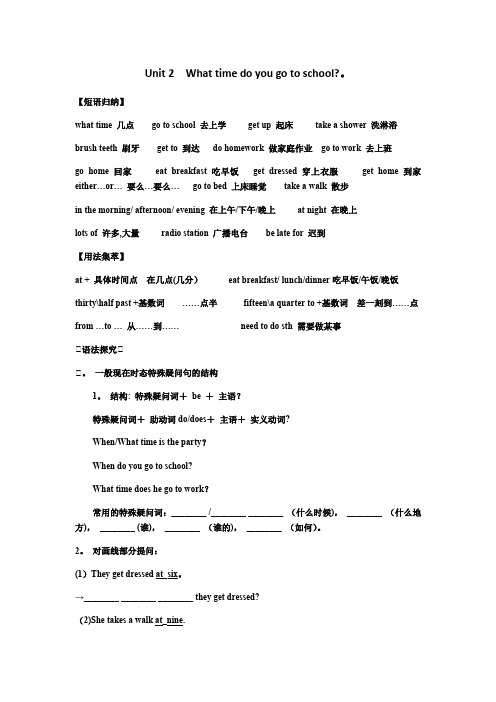
Unit 2What time do you go to school?。
【短语归纳】what time 几点go to school 去上学get up 起床take a shower 洗淋浴brush teeth 刷牙get to 到达do homework 做家庭作业go to work 去上班go home 回家eat breakfast 吃早饭get dressed 穿上衣服get home 到家either…or… 要么…要么… go to bed 上床睡觉take a walk 散步in the morning/ afternoon/ evening 在上午/下午/晚上at night 在晚上lots of 许多,大量radio station 广播电台be late for 迟到【用法集萃】at + 具体时间点在几点(几分)eat breakfast/ lunch/dinner吃早饭/午饭/晚饭thirty\half past +基数词……点半fifteen\a quarter to +基数词差一刻到……点from …to … 从……到…… need to do sth 需要做某事┃语法探究┃┃。
一般现在时态特殊疑问句的结构1。
结构: 特殊疑问词+be +主语?特殊疑问词+助动词do/does+主语+实义动词?When/What time is the party?When do you go to school?What time does he go to work?常用的特殊疑问词:________ /________ ________ (什么时候),________ (什么地方),________ (谁),________ (谁的),________ (如何)。
2。
对画线部分提问:(1)They get dressed at_six。
→________ ________ ________ they get dressed?(2)She takes a walk at_nine.→________ ________ she _______ a walk?(3)He usually swims in_the_lake.→________ ________ he ________ ?(4)Jack goes to school on_foot.→ ________ ________ Jack ________ to school?温馨提示: what time 对具体某一时刻进行提问;when 对笼统时间进行提问.┃. 英语时间表示法1。
人教版初一七年级英语(下)第二单元Unit2知识点+语法整合
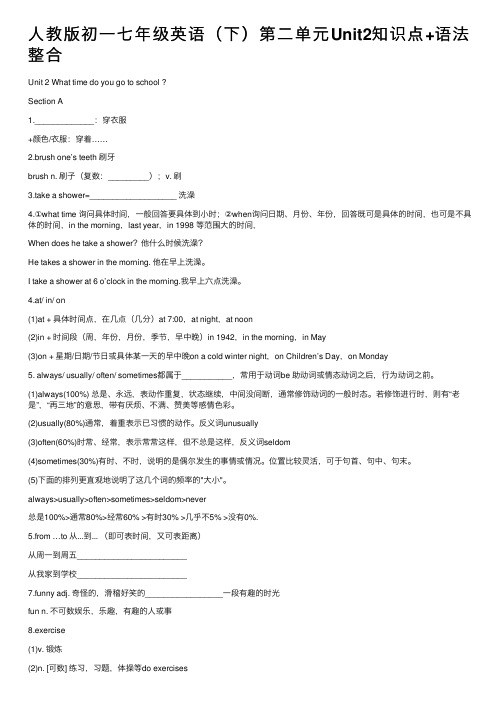
⼈教版初⼀七年级英语(下)第⼆单元Unit2知识点+语法整合Unit 2 What time do you go to school ?Section A1._____________:穿⾐服+颜⾊/⾐服:穿着……2.brush one’s teeth 刷⽛brush n. 刷⼦(复数:_________);v. 刷3.take a shower=___________________ 洗澡4.①what time 询问具体时间,⼀般回答要具体到⼩时;②when询问⽇期、⽉份、年份,回答既可是具体的时间,也可是不具体的时间,in the morning,last year,in 1998 等范围⼤的时间,When does he take a shower?他什么时候洗澡?He takes a shower in the morning. 他在早上洗澡。
I take a shower at 6 o’clock in the morning.我早上六点洗澡。
4.at/ in/ on(1)at + 具体时间点,在⼏点(⼏分)at 7:00,at night,at noon(2)in + 时间段(周,年份,⽉份,季节,早中晚)in 1942,in the morning,in May(3)on + 星期/⽇期/节⽇或具体某⼀天的早中晚on a cold winter night,on Children’s Day,on Monday5. always/ usually/ often/ sometimes都属于___________,常⽤于动词be 助动词或情态动词之后,⾏为动词之前。
(1)always(100%) 总是、永远,表动作重复,状态继续,中间没间断,通常修饰动词的⼀般时态。
若修饰进⾏时,则有“⽼是”,“再三地”的意思,带有厌烦、不满、赞美等感情⾊彩。
(2)usually(80%)通常,着重表⽰已习惯的动作。
Unit2知识点讲解人教版英语七年级下册

1.英语钟点时刻的表达在英语中,钟点时刻的表达除了用阿拉伯数字(如8:10,12:45)外,还可以用以下几种表达方式。
◆当时间是整点时,可用“钟点数+o'clock”来表达,其中o'clock可以省略。
如:6:00 → six (o'clock) 11:00 → eleven (o'clock)◆当时间不是整点时,表达方式有以下两种:1. 钟点数+分钟数。
如:9:08 → nine eight 14:40 → fourteen forty2. 分钟数+ past / to +钟点数1) 当分钟数小于30时,用“分钟数+ past +钟点数”表示“几点过几分”。
如:8:09 → nine past eight7:25 → twentyfive past seven2) 当分钟数大于30时,用“(60-分钟数) + to +下一个钟点数”表示“差几分到几点”。
如:11:40 → twenty to twelve 2:58 → two to three注意:在分钟数中,15分钟还可以用a quarter表示,30分钟还可以用half来表示。
如:11:15 → a quarter past eleven8:45 → a quarter to nine13:30 → half past thirteen◆ A.M.(a.m.)和P.M.(p.m.)在12小时制中,我们可以用A.M.(a.m.)和P.M.(p.m.)来区分上、下半天。
A.M.(a.m.)意为“午前、上午”; P.M.(p.m.)意为“午后、下午”。
如:早上六点半→ 6:30 a.m. / half past six in the morning中午十二点→ 12:00 p.m. / 12 o'clock in the daytime午夜十二点→ 12:00 a.m. / 12 o'clock at night / at midnight【运用】用两种方式写出下列时间的英语表达1. 2. 3.___________________ 或___________________ ___________________或______________________________________或___________________参考答案1. four thirty; half past four2. eleven five; five past eleven3. nine fifteen; a quarter past nine2. what time & when 引导的特殊疑问句what time和when均可对时间状语进行提问,用来询问什么时间。
人教版七年级英语下册第二单元知识点总结
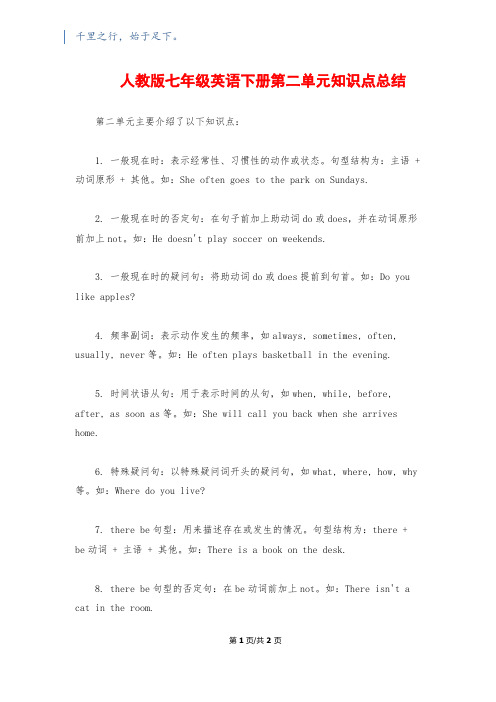
千里之行,始于足下。
人教版七年级英语下册第二单元知识点总结第二单元主要介绍了以下知识点:1. 一般现在时:表示经常性、习惯性的动作或状态。
句型结构为:主语 + 动词原形 + 其他。
如:She often goes to the park on Sundays.2. 一般现在时的否定句:在句子前加上助动词do或does,并在动词原形前加上not。
如:He doesn't play soccer on weekends.3. 一般现在时的疑问句:将助动词do或does提前到句首。
如:Do you like apples?4. 频率副词:表示动作发生的频率,如always, sometimes, often, usually, never等。
如:He often plays basketball in the evening.5. 时间状语从句:用于表示时间的从句,如when, while, before, after, as soon as等。
如:She will call you back when she arrives home.6. 特殊疑问句:以特殊疑问词开头的疑问句,如what, where, how, why 等。
如:Where do you live?7. there be句型:用来描述存在或发生的情况。
句型结构为:there + be动词 + 主语 + 其他。
如:There is a book on the desk.8. there be句型的否定句:在be动词前加上not。
如:There isn't a cat in the room.第1页/共2页锲而不舍,金石可镂。
9. there be句型的疑问句:将be动词提到句首。
如:Is there a park near your house?希望以上总结对您有所帮助!。
人教版七年级英语下册Unit2知识点归纳
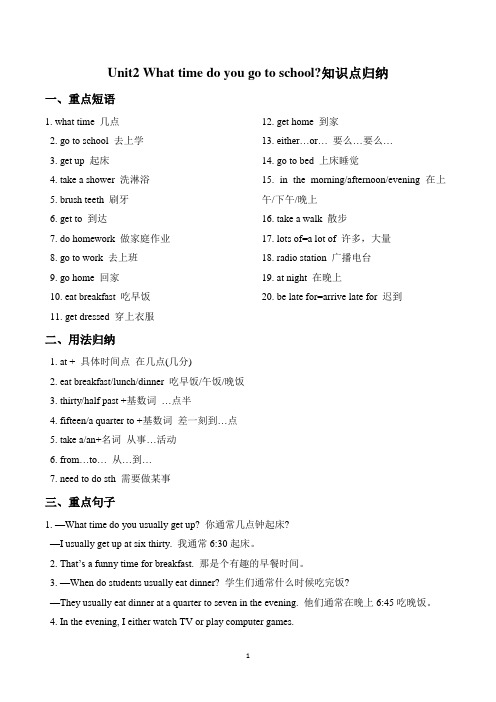
Unit2 What time do you go to school?知识点归纳一、重点短语1. what time 几点2. go to school 去上学3. get up 起床4. take a shower 洗淋浴5. brush teeth 刷牙6. get to 到达7. do homework 做家庭作业8. go to work 去上班9. go home 回家10. eat breakfast 吃早饭11. get dressed 穿上衣服12. get home 到家13. either…or… 要么…要么…14. go to bed 上床睡觉15. in the morning/afternoon/evening 在上午/下午/晚上16. take a walk 散步17. lots of=a lot of 许多,大量18. radio station 广播电台19. at night 在晚上20. be late for=arrive late for 迟到二、用法归纳1. at + 具体时间点在几点(几分)2. eat breakfast/lunch/dinner 吃早饭/午饭/晚饭3. thirty/half past +基数词…点半4. fifteen/a quarter to +基数词差一刻到…点5. take a/an+名词从事…活动6. from…to… 从…到…7. need to do sth 需要做某事三、重点句子1. —What time do you usually get up? 你通常几点钟起床?—I usually get up at six thirty. 我通常6:30起床。
2. That’s a funny time for breakfast. 那是个有趣的早餐时间。
3. —When do students usually eat dinner? 学生们通常什么时候吃完饭?—They usually eat dinner at a quarter to seven in the evening. 他们通常在晚上6:45吃晚饭。
七年级英语人教版下册Unit2重点知识点归纳
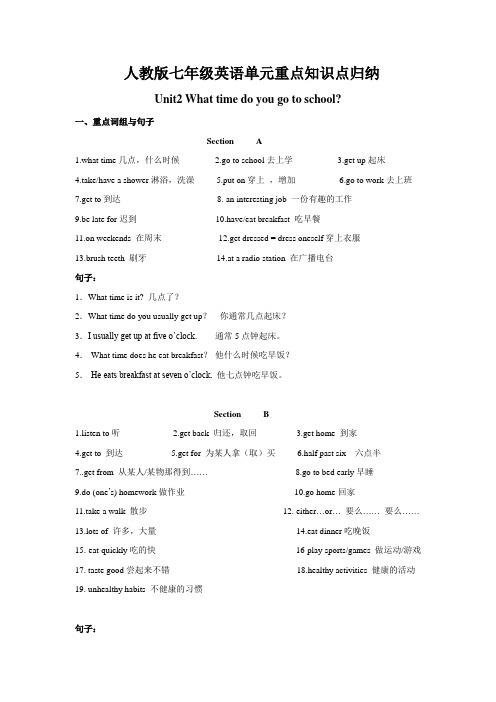
人教版七年级英语单元重点知识点归纳Unit2 What time do you go to school?一、重点词组与句子Section A1.what time几点,什么时候2.go to school去上学3.get up起床4.take/have a shower淋浴,洗澡5.put on穿上,增加6.go to work去上班7.get to到达8. an interesting job 一份有趣的工作9.be late for迟到10.have/eat breakfast 吃早餐11.on weekends 在周末12.get dressed = dress oneself穿上衣服13.brush teeth 刷牙14.at a radio station 在广播电台句子:1.What time is it? 几点了?2.What time do you usually get up?你通常几点起床?3.I usually get up at five o’clock. 通常5点钟起床。
4.-What time does he eat breakfast?他什么时候吃早饭?5.-He eats breakfast at seven o’clock. 他七点钟吃早饭。
Section B1.listen to听2.get back 归还,取回3.get home 到家4.get to 到达5.get for 为某人拿(取)买6.half past six 六点半7..get from 从某人/某物那得到……8.go to bed early早睡9.do (one’s) homework做作业10.go home回家11.take a walk 散步12. either…or…要么……要么……13.lots of 许多,大量14.eat dinner吃晚饭15. eat quickly吃的快16 play sports/games 做运动/游戏17. taste good尝起来不错18.healthy activities 健康的活动19. unhealthy habits 不健康的习惯句子:1.When do students usually eat dinner?学生们通常什么时候吃晚餐?2.I don’t have much time for breakfast.我没有许多时间吃早餐。
- 1、下载文档前请自行甄别文档内容的完整性,平台不提供额外的编辑、内容补充、找答案等附加服务。
- 2、"仅部分预览"的文档,不可在线预览部分如存在完整性等问题,可反馈申请退款(可完整预览的文档不适用该条件!)。
- 3、如文档侵犯您的权益,请联系客服反馈,我们会尽快为您处理(人工客服工作时间:9:00-18:30)。
Unit 2 What time do you go to school?child – children (pl.) 孩子tooth – teeth (pl.) 牙齿go to work 上班(反义词go home)go to bed 睡觉(反义词get up)短语句子what time 几点钟get up 起床get home到达家中go to class上课go to school 上学come back 回来get dressde穿衣服brush teeth刷牙get/be dressed in+衣服名词或颜色名词表示穿着…衣服或…颜色的衣服be in+颜色(穿戴…颜色衣服/帽子) dress sb.给某人穿衣dress oneself某人自己穿衣服put on 穿上(反义词take off)do one’s homework 做家庭作业have an interesting job 有一份有趣的工作talk about yourself谈论你自己work at the radio station 在电台工作your radio show 你的广播节目make breakfast做早饭eat quickly 吃得快eat vegetables 吃蔬菜eat breakfast =have breakfast/dinner/lunch 吃早、晚、午饭have sth. for breakfast / lunch / dinner 早/ 午 / 晚饭吃…..take a shower = have a shower 洗淋浴澡(have a show演出)make a shower schedule 做一个洗澡的安排from…to …从……到……be never late for work 上班从来不迟到be late for school=go to school late上学迟到了six thirty=half past six六点半 a quarter past three 三点一刻 a quarter to seven 六点四十五half an hour=a half hour 半小时around six o’clock 六点左右take a walk=have a walk=go for a walk 散步go out for a walk出去散步lots of= a lot of = much= many 大量,许多either…or…或者…或者good/well(好)→better较好→best最好sometimes= at times 有时tell sb. about sth. 告诉某人某事know about sth. 知道某方面的情况love to do =like to do 喜欢干某事watch the early morning news on TV 看电视早间新闻in the morning/ afternoon/evening在早上/下午/在晚上in the day在白天at night 在夜间on school nights在上学的晚上on school days在上学期间exercise on weekends 周末锻炼take / get exercise 运动/ 锻炼 do morning exercises 做早操visit / see your uncle 看望你的叔叔do eye exercises 做眼保健操do English exercises 做英语练习keep healthy / be healthy / stay healthy / keep in good health 保持健康What do you do ? =What are you ? =What’s your job ? 你是干什么的?get up early 起得很早 a quarter past three in the afternoon 下午3 点15分go home early 早点回家clean up the room 打扫干净房间clean the room 打扫房间clean my room 打扫我的房间play sports 做运动 do your homework first 先做作业listen to 听… listen to the early morning news on radio 听电台早间新闻don’t have much time for breakfast 没有很多时间吃早饭play basketball for half an hour 打半个小时的篮球either watch TV or play computer games 要么看电视要么玩电脑游戏eat a good breakfast 吃一顿丰盛的早餐eat lots of fruit and vegetables for lunch 午饭吃许多水果和蔬菜be good for your health 对你的健康有好处taste good味道很好have a very healthy life有一个健康的生活healthy activities 健康的活动unhealthy habits 不健康的习惯1.英语时间的表达(1)整点时间可表示为“钟点数+o’clock”或直接读钟点数,省去o’clock。
如:It’sten o’clock a. m. 现在是上午十点整。
(2)非整点时间可直接采取读数法。
如:It’s eight-thirty. 是八点三十分。
注意时间的表达方式:用数词。
点与分钟之间用连字如:eleven-thirty 11点30分nine-twenty-five 9点25分6:10 →six-ten 8:50→eight-fifty 9:30→nine-thirty10:15→ten-fifteen 7:45→seven forty-five 11:05→eleven-five(3)非整点时间的分钟数不超过30分钟,也可用介词“past”。
如:6:10→ten past six 11:05→five past eleven 10:15→a quarter past ten或fifteen past ten 8:15→a quarter past eight或fifteen past eight 9:30→half past nine或thirty past nine(4)非整点时间的分钟数超过30分钟,用介词to。
如:11:50→ten to twelve 7:31→twenty-nine to eight9:45→a quarter to ten或fifteen to ten 12:59→one to thirteen此句话还有几种表达方式。
如:What is the time? 几点了?What time is it by your watch? 你的手表显示几点了?A: What’s the time, please? B: It’s twelve o’clock.2. what time与whenwhat time翻译为“几点”问的是具体的时间,一般回答要具体到小时。
What time do you go to school? 你什么时候/几点上学?I go to school at half past seven o’clock. 我七点半去上学。
回答具体到点钟,且注意在几点前边的介词用at。
when也是对时间的提问,但与what time的区别是:用when提问,回答既可以是具体的时间,也可以是不具体的时间,如:in the morning,last year,in 1998等范围大的时间,例如:When does he take a shower?他什么时候洗澡?He takes a shower in the morning. 他在早上洗澡。
也可用具体时间:I take a shower at 6 o’clock in the morning. 我早上六点洗澡。
3. 关于一般现在时。
(语法重点)(1)一般现在时态的意义是:①表示现在的特征或状态。
如:He is at home today. 他今天在家。
②表示经常性、习惯性的动作。
常和频率副词always, often, usually及every day等表示时间的短语连用。
如:I go to school at 7:00 every day. 我每天7点钟去上学。
③表示主语具备的性格或能力。
如:She likes pears very much. 她非常喜欢梨子。
They speak English. 他们讲英语。
(2)肯定陈述句:当主语是第一、二和第三人称复数时,谓语动词用原形。
当主语是第三人称单数时,谓语动词用第三人称单数形式。
例如:①They stay at home on Sundays. 他们星期天呆在家。
②He does his homework in the evening. 他在晚上做作业。
(3)否定句:当主语是第一、二及第三人称复数时,否定句借助助动词do+not,当主语是第三人称单数时,否定句借用does+not,并将动词第三人称单数还原。
例如:①They don’t stay at home on Sundays. 他们星期天不呆在家里。
②Hedoesn’t do his homework in the evening. 他晚上不做作业。
(4)疑问句:当主语是第一、第二及第三人称复数时,疑问句在句首加Do。
当主语是第三人称单数时,疑问句在句首加Does,并把谓语第三人称单数还原。
例如:①Do they stay at home on Sundays? 他们星期天呆在家吗?②Does he do his homework in the evening? 他晚上做作业吗?△以speak为例归纳动词do的各种句式:肯定式否定式I speak English. I do not (don’t) speak English.You speak English. You do not (don’t) speak English.He/She/It speaks English. He/She/It does not (doesn’t) speak English.We/You/They speak English. We/You/They do not (don’t) speak English.疑问式和简略答语Do I speak English? Yes, you do. No, you do not (don’t).Do we speak English? Yes, we/you do. No, we/you do not (don’t).Do you speak English? Yes, I do. No, I do not (don’t).Do you speak English? Yes, we do. No, we do not(don’t).Does he/she/it speak English. Yes, he/she/it does. No, he/she/it does not (doesn’t).Do they speak English? Yes, they do. No, they do not (don’t).1. always, usually, often 和sometimes这四个副词表示行动或动作的频率。
